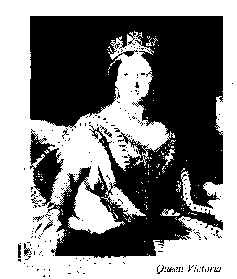
62
(in 1846). It was the greatest victory of the free traders. But it destroyed the Tory Party and R. Peel was forced
to resign.
The reforms brought cheaper food and exports from "the workshop of the world". And the Whigs inherited
the benefits of Peel's reforms.
Queen Victoria's Prime Ministers followed one another due to the Political developments in Parliament:
Lord Melbourne (1835-1841), Sir R. Peel, Lord John Russel, Earl of Derby, Earl of Aberdeen, Viscount
Palmerstone, Benjamin Disraeli, W. E. Gladstone, Earl of Ro-sebery, Marquess of Salisbury.
In 1840 Victoria married her cousin (see Table 6) of Saxe-Coburg of Gotha. The marriage was happy, and
the Royal family became a model for moral standards in high society as well as for the middle classes.
Prince Albert became deeply interested in the British affairs, both foreign and home. He was the initiator of
a great display of Victorian glory and progress in the country – the Great Exhibition of 1851. This international
exhibition was quite a new idea, and Albert had to overcome a lot of opposition. The Exhibition building was
an enormous glass-and-iron structure – the Crystal Palace in Hyde Park, it had on display machinery and
products from Britain, the Empire and other countries.
"The Crystal Palace" was the symbol of Technological progress. The new poet-laureate Tennyson wrote an
ode to it. All the Victorian writers, poets, painters glorified English culture. Tennyson and Browning dominated
the poetry. Charles Dickens in his novels David Copperfield, Oliver Twist, Nicholas Nickleby exposed the
social evils of the time. Thackeray exposed the middle class hypocracy in his "Vanity Fair". It was a great age
for novels. Women writers – the Bronte sisters, Mrs Gaskell–flourished as never before.
Thomas Hardy and Henry James were "Victorian" novelists too. The English drama was brilliantly
represented by Irish talents: Oscar Wilde wrote his brilliantly entertaining comedies, Bernard Shaw's plays
were more serious but extremely witty.
Painters of the group called the Pre-Raphaelite Brotherhood expressed the great Victorian nostalgia for the
Middle Ages.
Victorian science was to become greatly influential on the developments in the Modern Time. These three
men:
K. Marx (1818-1883) – the founder of Communism, Sigmund Freud (1856-1939) – the founder of
psycho-analysis and Ch. Darvin – the founder of
the
modem theory of biological evolution – shocked the
world.
Encouraged by Prince Albert, the Queen came into conflict with Palmerston. In 1854 the Crimean War broke
out – when Britain and France declared war on Russia in support of Turkey. Prince Albert had supported the
policy of preventing the war while Palmerston was given the Parliamentary support as the only Prime Minister
capable of winning the War, and the Queen was compelled to accept him as Prime Minister in 1855.
Palmerston became the symbol of British superiority in everything: in fights, in trade, in politics.

